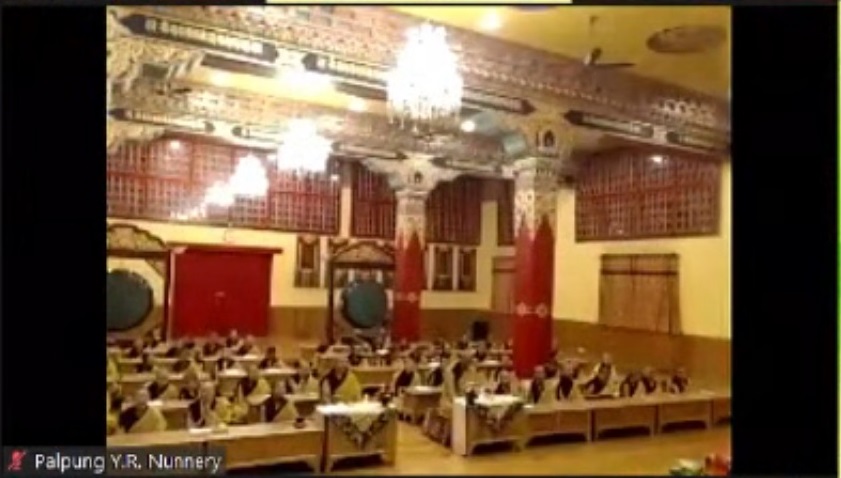法王新闻 | 2021年03月
『第6届谶摩春季』噶玛巴米觉多杰自传•第13天第2堂課
『6th Arya Kshema』AUTOBIOGRAPHICAL VERSES OF KARMAPA MIKYÖ DORJE•13-2
༸རྗེ་བརྒྱད་པ་མི་བསྐྱོད་ཞབས་ཀྱི་རྣམ་ཐར་བཀའ་ཁྲིད། བདེ་བྱེད་མའི་དཔྱིད་ཆོས་ཉིན་བཅུ་གསུམ་པ།

开示時間:2021年3月05日晚上10:30-11:30(北京/台北/香港)March 05, 2021
中文口译:堪布丹杰
中文笔录:释妙竹于2021年9月15日
English text source from: aryakshema website
米觉多杰的第八妙行——整天妄想众生都沉沦在痛苦中
The Seventh Good Deed: How He Practised the Path of the Lesser Individual
第八妙行——实践中士道之法
Part 3: The Eighth Good Deed – Practicing the path of the middling individual and removing the harmful view of the self
大家听得到吗?接下来要讲第八个妙行。第八个妙行就是『实践中士道之法』。颂文是:
སྐྱེས་བུ་འབྲིང་གི་ལས་ཐུགས་ཉམས་སུ་བསྟར་ཚུལ། How he practiced the path of the middling individual 实践中士道之法
༨༽ གཏིང་ནས་སྐྱེ་བའི་རྒྱ་མཚོ་མ་ཕྱིན་ན། ། ཁམས་གསུམ་གར་ཡང་བདེ་འབྱོར་མི་རྟག་པས། ། ནམ་མཁས་ཁྱབ་ཚད་ཁམས་གསུམ་འཁོར་བ་ནས། ། ནམ་གཞག་གཏན་གྱི་ཐར་པ་ནམ་ཐོབ་སྙམ། ། འདི་ཡང་བདག་གི་ལེགས་སྤྱད་ཡིན་སྙམ་བགྱིད། །
Unless we fully cross the ocean of birth and death, Nowhere in the three realms are pleasures and riches permanent. I wondered, when will I liberate forever All beings throughout space from the three realms of samsara? I think of this as one of my good deeds.
(8) 若非徹渡生死之海,任憑三界之隅,喜悅富足總是無常。故而時時思量:遍虛空眾生,何時方能從三界輪迴中永取解脫?此謂我妙行之一。
在米觉多杰的一部著作中提到,大意是说,在前面有谈到因果,下士夫最主要的修持就是要能够注重因果,正确地止恶行善等等。同时也提到注重因果的时候,不要伤害他人。所谓的不伤害他人,如果我们问一个问题「只是我们不去伤害众生,众生就能够不受到任何伤害了吗?」并不是的。为什么这么说呢?这是因为众生的内心中还有「业跟烦恼」,这是伤害他的最主要的东西。
Mikyö Dorje’s eighth good deed was how he practiced the path of the middling individual. This relates to how having a view of the self and having afflictions in our own being are harmful. In the path of the lesser individual, avoiding harming other sentient beings is the most important. That is the path of karma, cause, and effect. However, not inflicting harm on beings in the short term does not mean they are liberated from harm altogether. This is because in the being’s own continuum, there are karma and the afflictions which are the basis of causing harm. There are also an infinite number of other sentient beings with whom they have a karmic connection, who may harm them.
所以由于这样的一个原因,真正的症结点在哪里?要断除的伤害的根本是什么?其实就是我们自心上的「业跟烦恼」。「烦恼」可以说就是你的一种动机,但真正实际 的作为就是罪业。所以,如果不造作罪业的话,就算三界一切的恶人都结集起来,要对你制造伤害,你也不会受到伤害(Bamboo批:理论上是这样,但还关系到自己的智慧取舍和能力的问题。就像现在没有一个国家敢发签证给Bamboo,所以要如何做决定,便是一个很大的学问)。同样,如果你自己没有造作投入到轮回或恶道的恶业的话,也没有人能够伤害你,让你落入到轮回跟恶道。所以,真正伤害我们的,能够伤害到我们的是什么?就是我们自心当中执著有一个我的我见等等这些烦恼。
If we refrain from creating any bad karma, then even if all sentient beings gathered together to harm us, they wouldn’t be able to. If we do not perform the actions that lead to rebirth in samsara, no other being can throw us into it or cast us into lower realms. What harms us ultimately is the view of the self and the afflictions within us. The afflictions generate our motivations and the actual actions we do, the karma, are our misdeeds. There is no greater or more fundamental harm than that.
但是,直到现在,我们心中的这些我执,我们却不知道原来问题是它,它是真正的敌人,是真正伤害我们的人。反而把这样子一个我见、我执当成了一个亲人。甚至言听计从,这个「我执」怎么说,我们就怎么做。所以,我们让这个自我变本加厉地更严重了。最后你完全无法控制这种我见、我执。所以,造作了各种的业。因此,可以说从「三有顶」以下到「无间地狱」以上,甚至住处所有受用的东西,都会遭末劫水、火所摧毁,但是劫末的大火、大水也没有办法摧毁我们轮回的延续。所以,真正该怎么办呢?我们必须学习怎么样断除轮回的根本,斩断续流。(Bamboo批:米觉多杰是500多年前的古人,他那时就在考虑劫末的大水、大火不是搞笑嘛,他活个几十年死了,也同样除了业什么都带不走。现在这个时代网络上看到的中、美、欧这三个邪恶轴心各种天灾的情景,导满像劫末的。)
Up until now, we haven’t seen the view of the self and the afflictions as being our enemy or the cause of harm. We actually think of ego-clinging in particular as being our advisor. These thoughts of cherishing ourselves have resulted in the accumulation of many misdeeds and nonvirtues. Even with the destruction of the Earth at the end of an aeon either by fire or by water, all sentient beings and all possessions will be destroyed, but the continuum of beings cannot be stopped. To stop the sequence of being reborn in samsara, we need to train in the methods and prajna that can free us from karma and the afflictions.
方法呢,就是知道四谛——苦、集、灭、道。苦谛,像是疾病;集谛,像是疾病的原因;我们都要对于四谛,哪些是该取,哪些该舍等等的内容要有一个了解。那么佛陀在哪里有提到这样子的四谛取舍的内容呢?其实在三乘的教法当中,都有提到。这是我们一定要去学习的。当我们在做实修、修持的时候,只是口上说‘我要这样子修’,或者只是一种概念上要修行,是不行的。而是你真的要有一种急迫性,要感觉上去修持。举个例子来说,如果说有一只毒蛇突然跑到你的怀中,你会马上要把它甩掉、丢掉。同样,你的心中也有这样一条毒蛇,就是你内心中刚刚谈到的我见、我执。所以你要马上把这种‘我见’跟‘我执’,这些烦恼马上的消除。透过你的精进跟修持,要很快地、马上把它丢掉,你要有这样子的急迫性跟感受来做实修。” 米觉多杰这样子提到。
Method is practicing doing what we should do and avoiding doing what we shouldn’t, according to the Four Truths. This includes identifying karma, viewing suffering as being an illness, seeing the Truth of Origin as the cause, knowing the Four Noble Truths and so forth. This is taught in the Three Vehicles and in the sutras and tantras. Practicing them is indispensable. Moreover, we need to have an actual feeling or experience rather than relying on a mere understanding. For example, we should see the afflictions within our being as poisonous snakes. Then we must generate this intention, the diligence, and a strong feeling that we need to get away from them. Mikyö Dorje would tell people that unless we completely eliminate the pernicious illness of the view of the self, the liberation of being freed from the lower realms or achieving samsaric pleasures are not enough.
米觉多杰的妄想症
那么,米觉多杰对别人的告诫是这样子,那么他自己的修持,他自己又是怎么做到的呢?有些人是说,有一个人死了,譬如说一个叫扎西的人死了,很多人会说:“哦,那个人死了,他大概也从恶道中出离了,他大概后来也投为转轮圣王去了。”有人这样跟米觉多杰讲。就是他会跟米觉多杰说:“哦,我的亲人死亡之后”,传统就会去上师啊或一些卜卦师前去问嘛,就会问说“啊,我的亲人死了之后,投身到哪里去了?”“请告诉我他投身到哪里?”
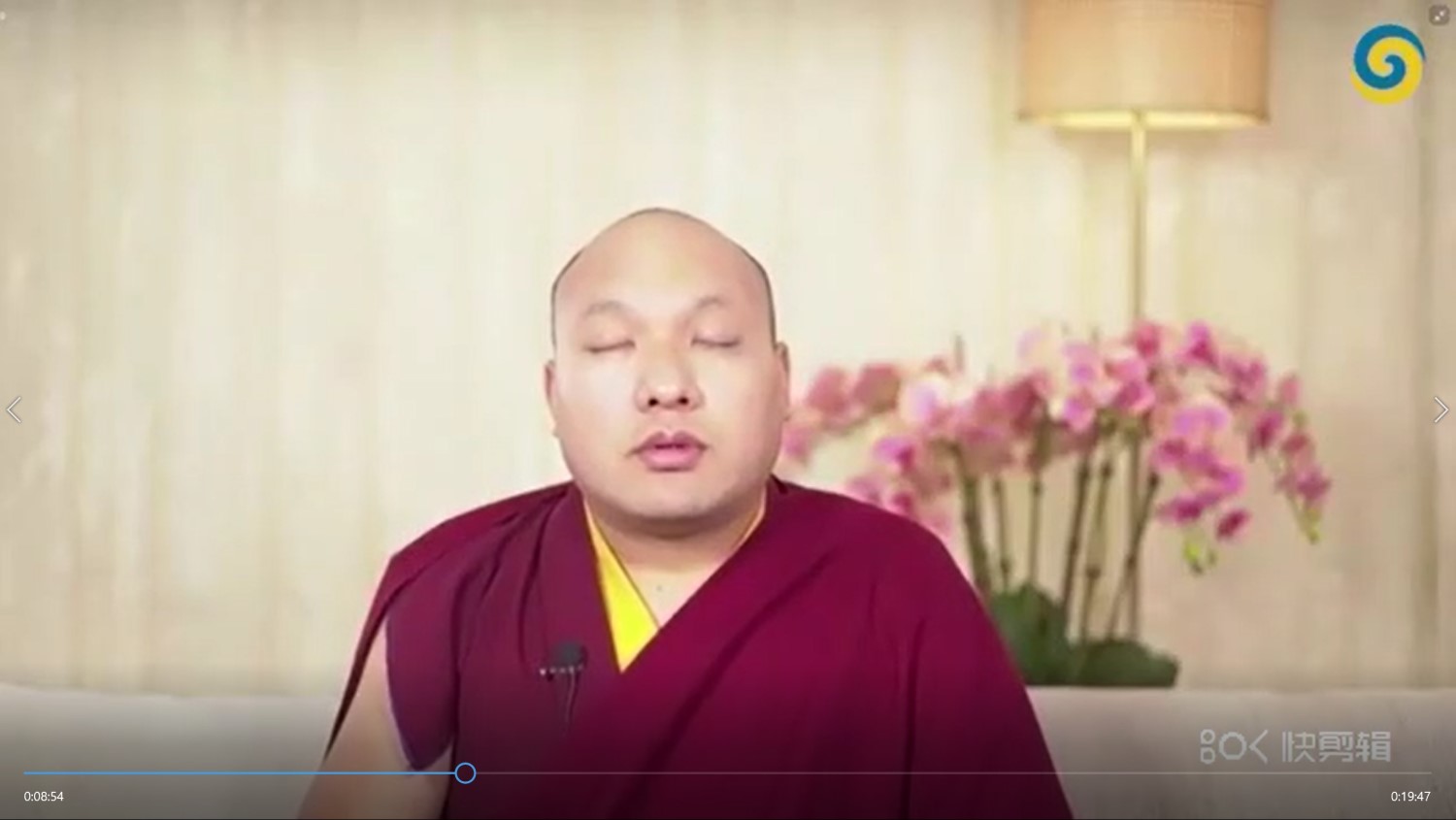
有些上师就会闭起眼睛,装着有点神通的样子说:”那你多念几万遍的六字大明咒,也供养我一点吧,我就会也为他回向,没问题的。“上师就会这样讲,装模做样的话。几个月之后这个人又来了,说“您说的我都做了,供养、然后持咒也做完了。”如果这个上师还是想要再多贪一些的话,他可能又说:“可能还是不行,这个供养你要再多一点。”但如果这个上师觉得说,这个人没什么钱,搞不好还不如找其他施主去。所以这时候上师可能就会骗他说,随口对他说:“搞不好你这个亲人已经投身到转轮圣王或者投身到莲花中化身之类的。“总之,当时有这样跟米觉多杰说。米觉多杰怎么说呢?他说:“如果一个人无法根除我见的恶疾,他的确还是能从恶道中解脱出来一两次吧,这可不是究竟的解脱,还是没有办法从轮回中真的解脱出来。”
同样,一些故事当中还提到,米觉多杰听到,或真的看到,那些因为饥饿而受苦的人,没有东西吃的人,或者没有衣服穿,没有鞋子,总之,很贫困的这些人,或者有人这样子跟他说:现在的情况很糟糕等等,很痛苦。报告的时候,他自己就会好像有一种发生在自己身上的同理心。之后,当他听到说,之前跟他说很痛苦的那个人远离了痛苦了,他好一些的时候,他就会说:“啊,现在是解脱了,但是这种解脱算是真的解脱吗?他未来可能还是要继续投身恶道,领受更无量长时间的痛苦。”他就说:“当他想到这里,担心到薪火攻心一样,头昏啊、头晕,甚至身体都不舒服。”米觉多杰这样说。米觉多杰的一些弟子做这样子的记载。还有一些时候,米觉多杰会问:“之前的某某人有什么消息吗?”那个被问的人,就回答说:“没什么消息。”这时候法王就说:“难道我们不知道一切众生是沉沦在痛苦的大海中吗?” 总之,他是很担忧的,他甚至还说:“如果没有从轮回当中彻底出离,一切都是没有意义的。”(Bamboo批:米觉多杰应该先从自己整天妄想别人都沉沦在痛苦中的精神病中先解脱出来。)
Mikyö Dorje worried deeply about those without enough food or clothing or those in desperate situations just as though it were happening to himself. Even if they experienced some temporary improvement, he would still worry. He would think “they are freed of their hardship for the time being but does this count as real liberation?” He knew that until they were liberated completely, they would have to experience endless suffering in samsara.
但是,这里并不是说米觉多杰畏惧轮回的痛苦,感到一种无可奈何,他不是的。那种并不知道该怎么办的情况,并不是的。他是对轮回的痛苦有畏惧的,他也关注别人在轮回中的痛苦。举例来说,很多时候我们会变得无可奈何,自己也很痛苦,也不知道该怎么办,结果晚上也睡不着,然后茶不思、饭不想。并不是这样的,米觉多杰畏惧轮回的痛苦并不是象这样无可奈何的,而是他非常积极地去找寻出离痛苦的方法是什么。他从佛经当中,佛陀的教法当中去看,就知道四谛法门的这些内容。尤其要具备了悟四谛两种无我空这样的智慧。有具备两种无我、空性的智慧的见、修、行的修持,然后日夜不停地精进去修。米觉多杰是这样在做。(Bamboo:前面不是说米觉多杰担心到每晚都睡不着觉,瘦成尖嘴猴腮样嘛?他应该是成天担心保不住噶玛巴的位子,只好整天幻想别人都沉沦在痛苦中来自慰。。)
However, although he feared the sufferings of samsara for himself and couldn’t bear the thought of the suffering of others, he knew he could help sentient beings. He said the way to free ourselves from suffering is to study and practice what the Buddha taught. The method was practicing the Four Truths and the prajna was realizing the two types of selflessness. He worked hard to habituate himself to this, and he told others to practice the Four Noble Truths in this way.
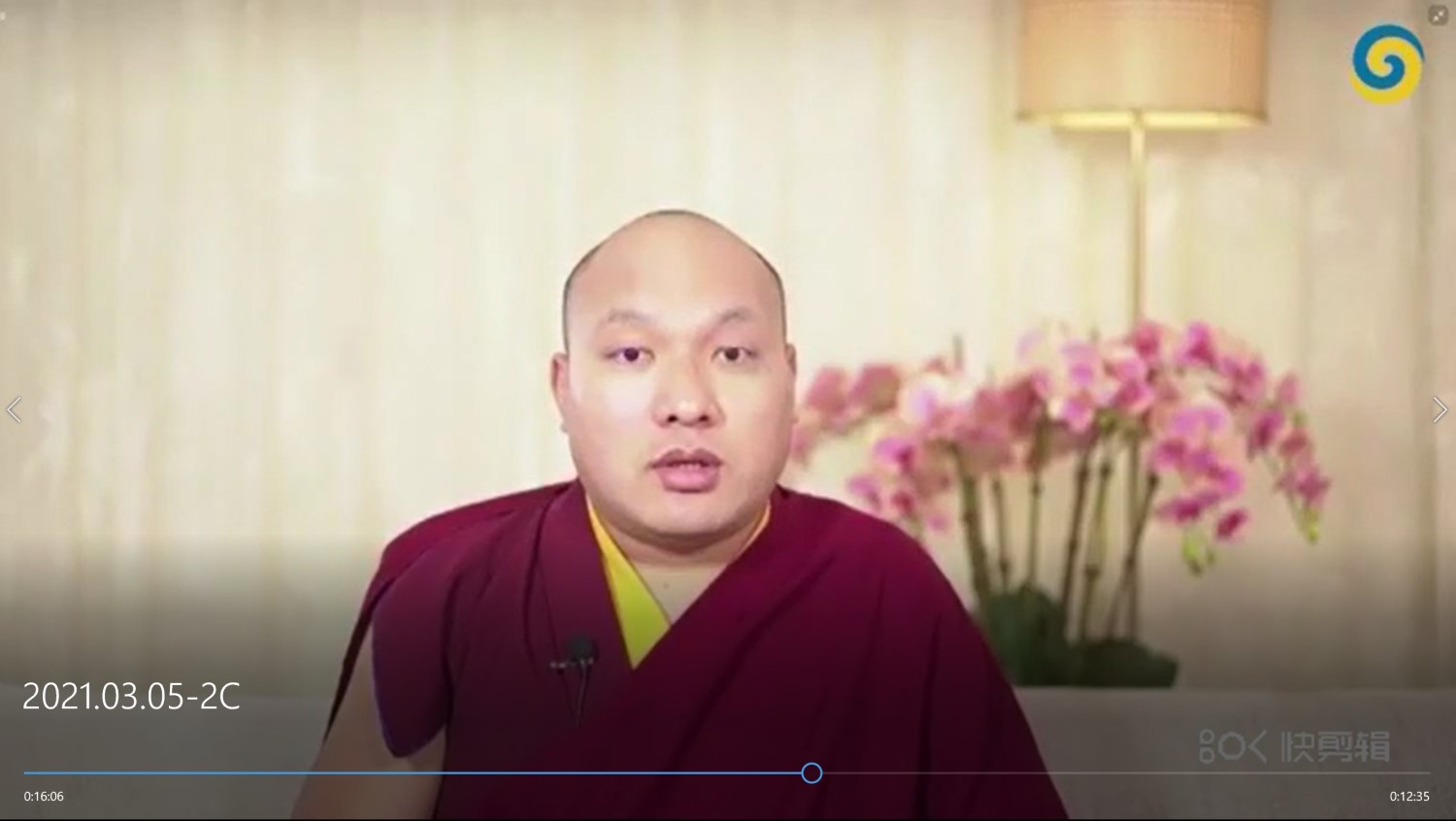
同时,他也会对一些人要这样子去修四谛,但是很多人会说:“啊!我福气不够啊。”就算他有了房子,但这个房子总会漏水;譬如说他有车子,但这个车子总是有问题;他也有婚姻,但是婚姻总是不太顺。我们会说“他没有福气”,就说他这个福气不够,或者还有痛苦的时候,会没有办法面对。所以很多人会说:“学佛,就是为了能够享得起这种福,或者说能够经得起这种痛苦而修持。”还有一些上师会对弟子说:“没有关系啊,你不用害怕这个轮回的痛苦。轮回没什么事,一切显现皆是法身的游戏显现。所以,你只要不放逸地安住在这些错乱显像中就好了。那个错乱在哪里,你就安住在哪里,不需要想太多,根本不用担心,就这样子安住坐着。”
His Holiness cautioned against practicing the Dharma to gain happiness in this lifetime alone. He noted that if some people don’t have a good house or have many family problems, they say they “lack merit”. They think that practicing the Dharma is to bring happiness and to be free of suffering in this lifetime and they practice with this intention. They go to lamas who tell them there’s no real problem, that everything that arises is the display of dharmakaya. The lamas advise them to rest within confused appearances as they are without being distracted and say everything will work out. “Just sit there”, the lamas tell their students.
还有些人,弟子觉得这样说还不够。还有些人会热烈地想要去闻、思、修,但是他闻思修的目的和动机是为了今生,就像刚刚谈到的培福或者福气啊等等,这是没有任何意义的。好像看起来很精进、很努力地在闻思修,但是都只是为了今生的一些目的。米觉多杰也说,“这样子的闻思修也没有任何的意义。因为闻思修最主要的目的是出离轮回、得证佛果。不是为了得到今生的享福。事实上为了今生,也不需要闻思修,还有其他许多的方法都可以帮助你达到此生的目的。”总之,米觉多杰知道这些都是错误的、颠倒的行为,因此他舍弃了这些作为。
But many people aren’t satisfied with this response. So they try to listen to, meditate on, and contemplate the Dharma, but they do so to gain happiness in this lifetime. This is pointless. Mikyö Dorje would never do such actions himself, His Holiness stated. We listen to, meditate on, and contemplate the Dharma to attain liberation and the state of buddhahood, not to gain temporary pleasures in this lifetime.
这段简略提到一个中士夫的修持的内容。至于上士夫的这些内容,因为后面的妙行,现在我们讲了八个妙行,但是从第九个妙行开始到后面大部分妙行都是大乘、上士夫的妙行,到目前为止来看的话,这次课程大概没办法把所有妙行讲完。为什么这次可能讲不完呢?因为大部分还是要做些解释,如果只是这样念过去可不行。不然前面几堂课讲得比较详细、比较多,但后面变得就念过去,这样也没有太大的意思。如果是头重脚轻的话,这样就不好了。所以,这次就尽力地多做一些解释。然后就看课程讲到哪里,之后明年再把没有讲完的部分讲完吧,不然太勉强要把它讲完的话,我觉得这个内容也不会太好的,自己身体可能也不堪负荷。
This is a brief description of how Mikyö Dorje practiced the path of the middling individual. The rest of the text is about how he practiced the third path, that of the great individual.
米觉多杰的素食主义
Part 4: Mikyö Dorje on vegetarianism
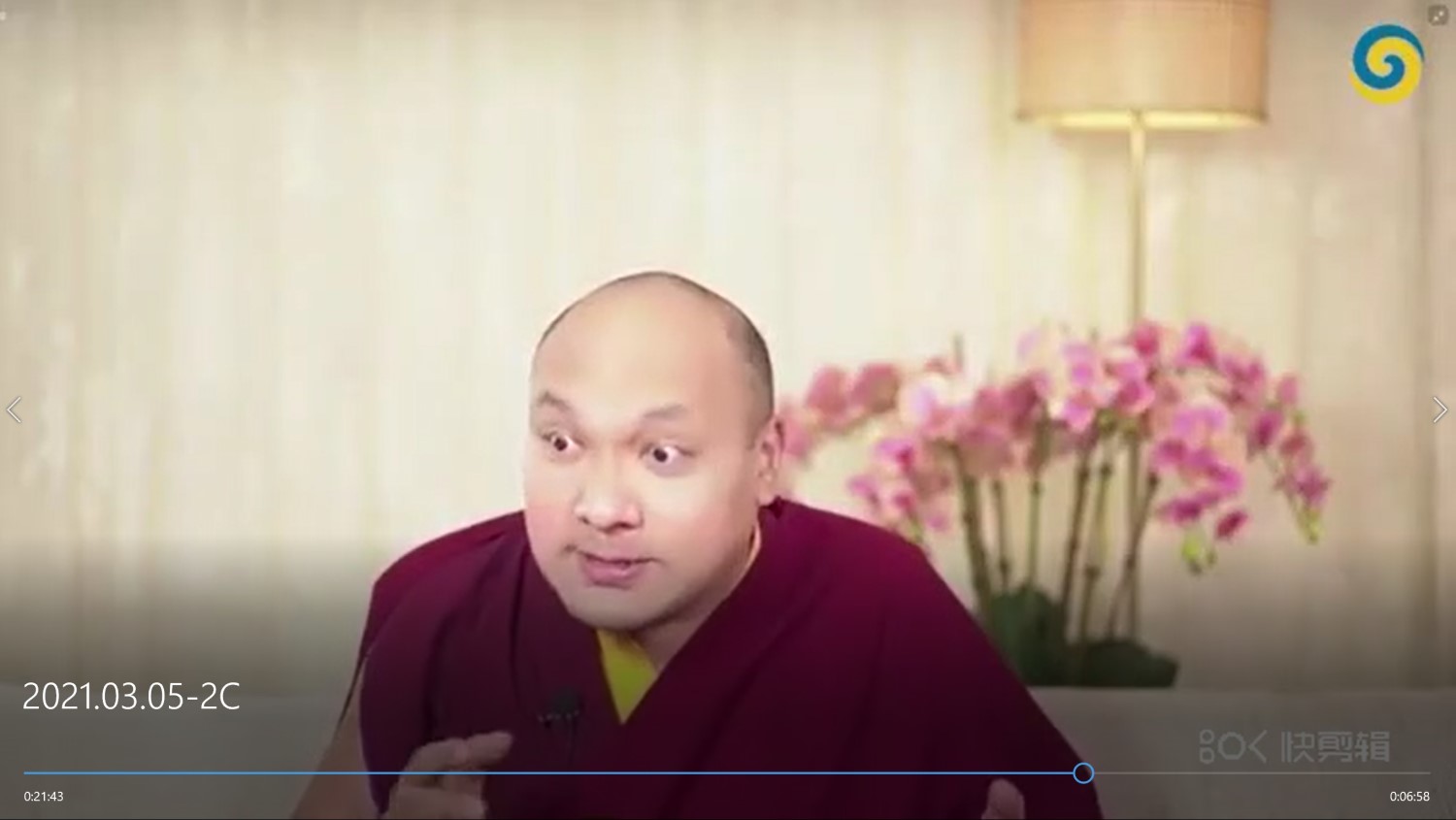
今天就主要讲到第七跟第八个颂文的妙行。提到蛮多这个吃素的部分,一般来说,米觉多杰的时候,为什么要断肉、吃素?前几天大概也谈到过,我自己也觉得是有很多原因的,一方面来说是嘎千大营,从前几世噶玛巴的时候,就已经禁止把肉跟酒带到大营,禁止的一些原因,我想在讲嘎千大营的时候再多说一些,今天就不多说。总之,从过去历代噶玛巴的时候,就有禁肉、禁酒的这样一个情况,这是第一个原因为什么米觉多杰也倡导吃素。第二个原因是米觉多杰他很小的时候,也就是那时被说是噶玛巴升座,但他其实也并没有实际的权力,因为当时年纪小,他的权力都被嘎千那些大人物掌控了。之前也有提到过,当时嘎千那些所谓的大人物呢,总之,就是落入到了一个女生的手中了,上次有提过。所以,那时候就没有章法了,所有供养的牲畜,大营的人就把它杀了、宰来吃。
For the rest of today’s teaching, His Holiness wanted to further explain Mikyö Dorje’s reasons for not eating meat. In large monasteries at that time, many animals would be killed. Similarly, sometimes people wanted to give good food to lamas and their entourage and so a lot of meat would be offered. Mikyö Dorje saw that this caused many difficulties so wherever he went, he would very skillfully get others to give up eating meat.
First, by prohibiting meat consumption, Mikyö Dorje was returning to earlier traditions of previous Karmapas who did not allow meat or alcohol to be brought into the Great Encampment. Second, when Mikyö Dorje was first put on the throne of the Karmapa when he was young, he did not have much freedom or control. All the power was in the hands of the Encampment’s leaders and one of their wives. At that time, all of the animals that were offered to the Encampment were killed and their flesh was eaten.
所以他很小的时候,周围的人就跟他说:“我们要做荟供,如果荟供中有这样一大头羊煮来供,这样可以吗?”米觉多杰也说,“这样是绝对不行的。”所以从米觉多杰小的时候开始,他身边的人,也就是嘎千大营当中的很多的这些主事者,就开始没有章法,甚至吃肉、喝酒的一些情况,到之后,米觉多杰稍微有些权力了,稍微能够主事了,才很清楚地、严厉禁止了这些吃肉、喝酒的情况。各位佛学院的学生应该看过米觉多杰律典的注释,里面有提到很多,甚至在噶举道歌海法会上,连供品上都不可以放有肉,是很严厉的。然而,不仅是嘎千大营当中,不准吃肉,甚至米觉多杰对于全西藏都广大地提倡要吃素。在一个教言当中,就有提到这样的一个做宣传的教令,就有提到说,到目前为止,我还没拿到这个教令,总之工布的一个公文当中就提到说:“全民都不要吃肉。“总之,如果以后拿到这个教令,我们就知道这里面不仅记载说,不止嘎千大营中断肉,他同时也广大地提倡西藏全境都不要吃肉,这部分我想在讲到嘎千大营时再多讲一些。
When Mikyö Dorje was young, people would approach him saying they needed to have Ganachakras with meat and alcohol. Mikyö Dorje felt this didn’t work at all. Those in the Encampment were no longer respecting the Encampment’s earlier traditions, eating meat without any restraint and drinking alcohol. Once Mikyö Dorje gained some control and influence, he made a strict rule prohibiting eating meat and drinking alcohol. He not only restricted eating meat in the Great Encampment, but he promoted vegetarianism to all Tibetans. In Mikyö Dorje’s commentary on the Vinaya, The Orbit of the Sun, he said even when we do the Gutor, the Mahakala ritual at the end of the year, we should not include meat in those offerings. In the index of his collected works, his advice to Tibetans was that it is inappropriate to eat the meat of defenseless animals.
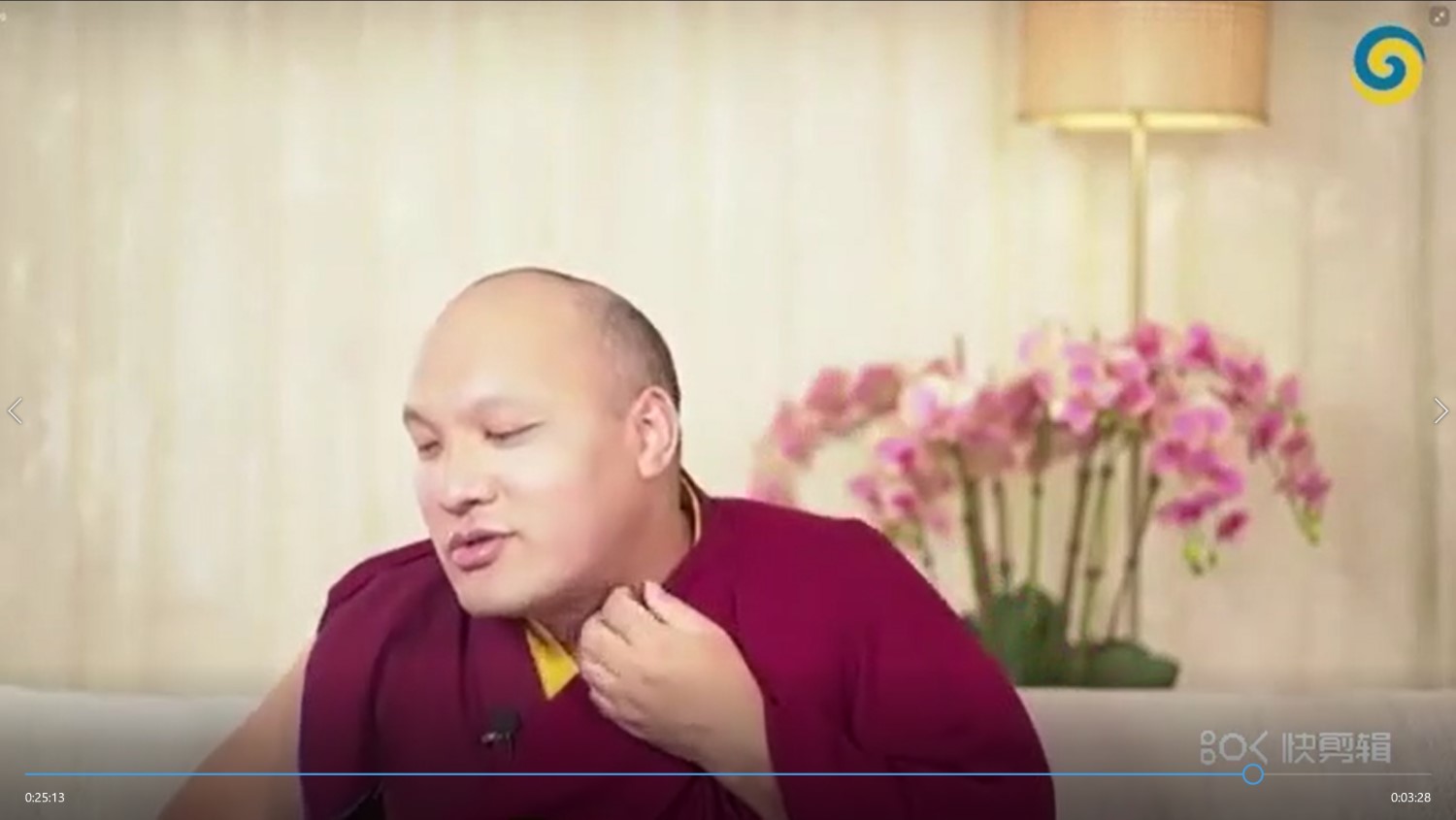
(Bamboo:像大马猴。)
米觉多杰当中,讲到相关内容总会提到嘎千大营,但我们现在已经没有嘎千大营了,所以很多人可能没有办法想象是一个怎么样的样子。之前有些人跟我这样子说,“你讲了这么多嘎千大营”,所以我就想说,要讲一下嘎千大营。但是没那么容易,因为嘎千大营相关的文字记载可能是散落在不同的文献、不同的教言当中,但我想可能明天讲吧。总之,如果明天再不讲的话,那我就真的不是人了,我是只狗。
总之,希望明天多说一些嘎千大营,但是不是能说得如我所愿。主要的原因是嘎千大营跟米觉多杰的关系是很紧密的,这是第一点,那另外一点,嘎千是怎么形成的,之后嘎千大营存在的,还有它兴盛的过程,各种的缘起,当时的一些发生,如果大家知道的话,等于是知道了过去历代噶玛巴的一些特殊的行谊跟功德。所以,必须要讲一下嘎千大营的。好,我想今天大概就讲到这里,然后我们做课诵。
In the next session, His Holiness would like to teach about the Great Encampment, which is intimately related to Mikyö Dorje’s activities and life story. Once we understand how and why it was first formed, it may provide insight into the Eighth Karmapa’s intentions and actions. Yet, as there is no Great Encampment now, it is difficult for us to form a mental image of what it was, what it was like, and how it flourished. However, teaching on the Great Encampment will be challenging for His Holiness because small bits of information about it are scattered across many different texts. His Holiness then ended today’s teachings with dedication prayers.
Youtube 视频
